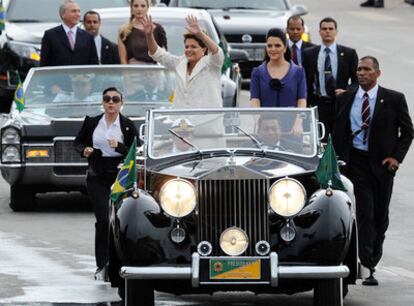Brazil's first woman president takes office pledging to eradicate poverty
Rousseff will have an absolute majority in Congress to get legislation passed
In the middle of pouring rain - relief after some four months of drought - Dilma Rousseff was sworn in on Saturday as the first woman president of Brazil. The 60-year-old economist, dressed in a pearl-colored suit, immediately announced an overhaul to the tax code and pledged to "end poverty and inequality" during her mandate.
It was an emotional day for Brazilians, who saw their most popular president, Luiz Inácio Lula da Silva, leave office with a host of achievements under his belt, not least improving living standards for most citizens while stoking an economic boom. Rousseff had words of praise for her predecessor and mentor, whose legacy she promised to consolidate, but she stressed: "Brazil has improved, but now a new era is opening, a new awakening for the country."
By keeping a heavy economic team, she sends a strong message to investors
The president will have to be on the alert to rein in public spending
A tearful Lula da Silva kissed her on the cheeks and gave her a bear hug after he placed the green, yellow and blue presidential sash around her shoulder.
In her inaugural speech - which was delivered on the floor of Congress, with 55 foreign delegations present (the Spanish contingent was headed by Prince Felipe) - Rousseff announced that she would completely overhaul the tax code as well as the Brazilian currency system; Lula da Silva had tried to do this on several occasions but with limited success. She also said that her immediate objectives would be to combat the "scourge" of inflation, which is listed at five percent.
The new president also promised to abolish poverty, which still affects 22 million citizens, and improve the country's infrastructure. Nevertheless, she said that her government "will not make unnecessary expenses," pledged to keep "economic stability," and work to maintain growth. Recent oil finds off the Brazilian coast near Rio could help meet the country's domestic needs for years to come and turn Brazil into one of the United States' biggest suppliers. Rousseff described the discoveries, which were announced in 2007, as "a passport to the future," while also claiming that Brazil would be a leader in clean energies.
But the president will have to be on the alert to rein in excessive public spending. Before they finished their last session of the year, lawmakers voted in a round of salary hikes amounting to 2.2 billion reales. Brazil, Rousseff added, would not make "concessions to international protectionism," but stated that relations with the United States and the European Union would be broadened.
By keeping the backbone of Lula da Silva's solid economic team, Rousseff is sending a clear message to investors.
Three of the key figures in her Cabinet are her chief of staff, Antonio Palocci, a powerful former economy minister who has been attributed with winning the confidence of investors in the early years of Lula da Silva's mandate; Guido Mantega, a longtime adviser to the former president, who now takes over the position as finance minister; and Alexandre Tombini, who will become central bank president. In total, 16 of Rousseff's 37 ministers held portfolios under Lula da Silva (10 during his last term). Some analysts say this incoming government is still Lula da Silva's government, but that within a year or two the new president will begin to pick her own closest advisors.
In an unprecedented move, the first in Brazil's democratic history, voters have given the new president an absolute majority in Congress. About a dozen parties, which supported Rousseff's candidacy, will now hold seats in both chambers of Congress. The president's allies will take 372 of the 513 seats in the Chamber of Deputies and 60 of the 81 senate seats - even more than the three-fifths that they would need to amend the Constitution.
For her first official trip abroad, Rousseff will visit Argentina and Uruguay. She also has preliminary plans to visit the United States and China, according to the official Brazilian state news agency BNO. In addition, Rousseff wants to visit Peru and Bulgaria. The president's father was from Bulgaria.
Among the dignitaries she met with was Prince Felipe. During the 40-minute meeting with the heir to the Spanish throne, Rousseff discussed current Spanish investments in Brazil, such as in the telecommunications, banking and energy sectors.
The president invited Spain to collaborate further in her country, especially before the 2014 World Cup and the 2016 Olympics, in which Spanish companies, she said, could invest more.
Rousseff told Prince Felipe that she wanted to turn Brazil into a bilingual Portuguese-Spanish speaking country.

Tu suscripción se está usando en otro dispositivo
¿Quieres añadir otro usuario a tu suscripción?
Si continúas leyendo en este dispositivo, no se podrá leer en el otro.
FlechaTu suscripción se está usando en otro dispositivo y solo puedes acceder a EL PAÍS desde un dispositivo a la vez.
Si quieres compartir tu cuenta, cambia tu suscripción a la modalidad Premium, así podrás añadir otro usuario. Cada uno accederá con su propia cuenta de email, lo que os permitirá personalizar vuestra experiencia en EL PAÍS.
¿Tienes una suscripción de empresa? Accede aquí para contratar más cuentas.
En el caso de no saber quién está usando tu cuenta, te recomendamos cambiar tu contraseña aquí.
Si decides continuar compartiendo tu cuenta, este mensaje se mostrará en tu dispositivo y en el de la otra persona que está usando tu cuenta de forma indefinida, afectando a tu experiencia de lectura. Puedes consultar aquí los términos y condiciones de la suscripción digital.








































